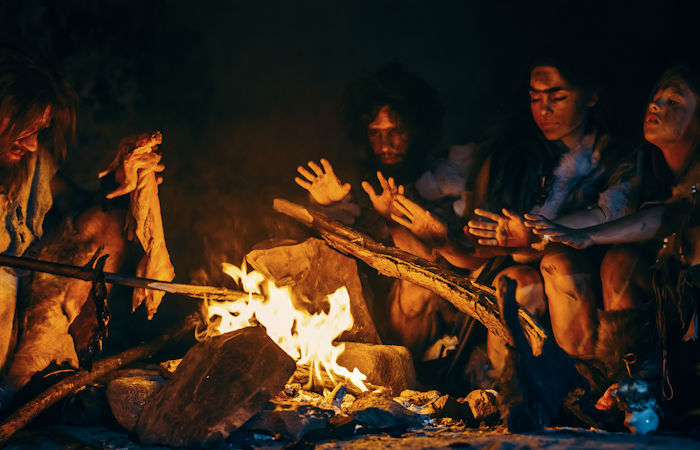Mystery Of The Black Irish People: Who Were They?
Ellen Lloyd - AncientPages.com - You might have heard the term "Black Irish" before, but who were these people? Where did they live and come from?
The term "Black Irish" is generally used for people of Irish origin with dark features, black hair, darker skin, and dark eyes. Interestingly, the term is rarely referred to in Ireland but has circulated among Irish emigrants and their descendants for centuries.
Credit: Adobe Stock - Gorodenkoff
Ireland has been subject to numerous invasions from several different countries throughout history. The Celts arrived on the island about the year 500 B.C. The Vikings arrived in Ireland as early as 795 A.D. and funded the Norse Kingdom of Dublin in 839 A.D.
The Kingdom of Dublin ended in 1171 when the Normans arrived. The Normans faced these Hiberno-Norse kingdoms in Ireland, and gradually, society began to evolve into what is now known as Norman Ireland.
It is very likely the Vikings would have stayed in Ireland much longer if it hadn't been for the famous Irish hero Brian Boru who dared to chase off the Vikings, often called dark invaders or black foreigners. The Gaelic word for foreigner is "gall," and for black (or dark) is "dubh."
Many invaders' families took Gaelic names that utilized these two descriptive words. The term' Doyle' is in Irish "O'Dubhghaill," which means "dark foreigner, " revealing their heritage as an invading force with dark intentions.
In 1588, members of the Spanish army were shipwrecked on the coast of Ireland. If they had stayed on the island and created families, their genes could have been spread throughout the generations.
However, most historians believe that most of these Spanish soldiers were handed over to the British authorities and executed, so it's unlikely that any who survived could've impacted the country's gene pool.
During the Great Famine of 1845 to 1849, hundreds of thousands of Irish peasants emigrated to America. They were labeled "black" because they escaped this new kind of black death. After the famine, many Irish reached America, Canada, Australia, and beyond.
The relationship between Ireland and Britain was weak during the 1800s, which resulted in mistrust. The British government did not offer enough assistance to help solve the problems.
The British may have used 'Black' as a derogatory term.
It is challenging to determine when the term "Black Irish" was first used, but several historical events in Ireland contributed to the word's birth. As we have seen, there are numerous theories about how the term originated.
The theory that the "Black Irish" are descendants of any small foreign group that integrated with the Irish and survived is unlikely. It seems more likely that "Black Irish" is a descriptive term rather than an inherited characteristic applied to various categories of Irish people over the centuries.
Written by Ellen Lloyd – AncientPages.com
Updated on march 23, 2024
Copyright © AncientPages.com All rights reserved. This material may not be published, broadcast, rewritten or redistributed in whole or part without the express written permission of AncientPages.com
Expand for referencesReferences:
More From Ancient Pages
-
 Secret Tunnels Used By Knights Templar Leading To The Treasure Tower – Discovered
Archaeology | Oct 29, 2019
Secret Tunnels Used By Knights Templar Leading To The Treasure Tower – Discovered
Archaeology | Oct 29, 2019 -
 What Were The Most Important Medieval Marketplace Rules?
Ancient History Facts | Mar 25, 2024
What Were The Most Important Medieval Marketplace Rules?
Ancient History Facts | Mar 25, 2024 -
 Large Collection Of 2,200-Year-Old Tombs With Boat Coffins Made Of Nanmu Wood, Unearthed In SW China
Archaeology | Feb 10, 2017
Large Collection Of 2,200-Year-Old Tombs With Boat Coffins Made Of Nanmu Wood, Unearthed In SW China
Archaeology | Feb 10, 2017 -
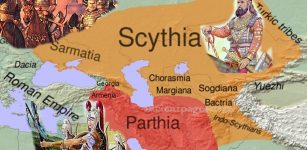 New Light On Appearance Of Scythians In Northern Black Sea Region
Archaeology | Mar 11, 2017
New Light On Appearance Of Scythians In Northern Black Sea Region
Archaeology | Mar 11, 2017 -
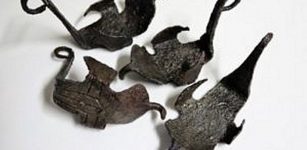 Remarkable ‘Hipposandals’ Found At Vindolanda
Archaeology | Aug 18, 2018
Remarkable ‘Hipposandals’ Found At Vindolanda
Archaeology | Aug 18, 2018 -
 First Fossils Of Ancient Human Relatives Sent To Space – Tribute To Science And Our Ancient History
Fossils | Sep 12, 2023
First Fossils Of Ancient Human Relatives Sent To Space – Tribute To Science And Our Ancient History
Fossils | Sep 12, 2023 -
 Enigmatic Voynich Manuscript: Computer Scientists From Alberta Use AI To Decipher Document
Archaeology | Jan 31, 2018
Enigmatic Voynich Manuscript: Computer Scientists From Alberta Use AI To Decipher Document
Archaeology | Jan 31, 2018 -
 Legend Of The Loretto Chapel Staircase – Unusual Helix-Shaped Spiral Construction
Featured Stories | Nov 1, 2018
Legend Of The Loretto Chapel Staircase – Unusual Helix-Shaped Spiral Construction
Featured Stories | Nov 1, 2018 -
 King Solomon’s Magical Shamir Could Cut Through Any Stone – Proof Of Advanced Ancient Technology?
Featured Stories | Aug 23, 2018
King Solomon’s Magical Shamir Could Cut Through Any Stone – Proof Of Advanced Ancient Technology?
Featured Stories | Aug 23, 2018 -
 Ancient Aqueduct System Discovered In Boroujerd, Lorestan
News | Sep 16, 2015
Ancient Aqueduct System Discovered In Boroujerd, Lorestan
News | Sep 16, 2015 -
 Mada’in Saleh: Magnificent Timeless Rock-Cut Tombs And Monuments In The Desert
Civilizations | Oct 30, 2018
Mada’in Saleh: Magnificent Timeless Rock-Cut Tombs And Monuments In The Desert
Civilizations | Oct 30, 2018 -
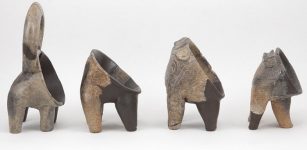 Evidence Of 7,200-Year-Old Cheese Production Found On Dalmatian Coast
Archaeology | Sep 7, 2018
Evidence Of 7,200-Year-Old Cheese Production Found On Dalmatian Coast
Archaeology | Sep 7, 2018 -
 Nabopolassar: Father Of Nebuchadnezzar II And King Of Babylon Rose To Power Thanks To His Dedication To Gods Nabu And Marduk
Featured Stories | Jan 11, 2019
Nabopolassar: Father Of Nebuchadnezzar II And King Of Babylon Rose To Power Thanks To His Dedication To Gods Nabu And Marduk
Featured Stories | Jan 11, 2019 -
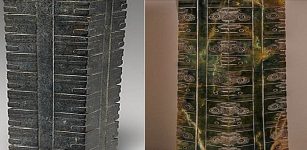 Mysterious Jade Cong – Perplexing Ancient Chinese Artifact
Featured Stories | Jan 3, 2023
Mysterious Jade Cong – Perplexing Ancient Chinese Artifact
Featured Stories | Jan 3, 2023 -
 Early Harappan Cultures Can Solve Mysteries Of Several Lost Cities Of Indus Valley Civilization
Artifacts | May 30, 2019
Early Harappan Cultures Can Solve Mysteries Of Several Lost Cities Of Indus Valley Civilization
Artifacts | May 30, 2019 -
 Stonehenge Served As An Ancient Solar Calendar And We Know How It Worked – Scientists Say
Archaeology | Mar 2, 2022
Stonehenge Served As An Ancient Solar Calendar And We Know How It Worked – Scientists Say
Archaeology | Mar 2, 2022 -
 Lavish Home And Exotic Garden Of Emperor Caligula Discovered In Rome
Archaeology | Nov 19, 2020
Lavish Home And Exotic Garden Of Emperor Caligula Discovered In Rome
Archaeology | Nov 19, 2020 -
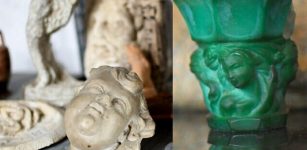 Thousands Of Spectacular Stolen Ancient Treasures Discovered Hidden In Major Bust
Artifacts | Jan 5, 2021
Thousands Of Spectacular Stolen Ancient Treasures Discovered Hidden In Major Bust
Artifacts | Jan 5, 2021 -
 A Remarkably Well-Preserved Wooden Well Dating Back To The Bronze Age Uncovered In Benson, Oxfordshire
Archaeology | May 10, 2024
A Remarkably Well-Preserved Wooden Well Dating Back To The Bronze Age Uncovered In Benson, Oxfordshire
Archaeology | May 10, 2024 -
 Ancient People Dressed Baby Boys In Blue To Ward Off Evil Spirits
Ancient History Facts | Mar 5, 2019
Ancient People Dressed Baby Boys In Blue To Ward Off Evil Spirits
Ancient History Facts | Mar 5, 2019

